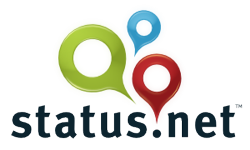
- Image via CrunchBase
If you haven’t heard of Twitter, you may have been living under a rock for the last few years. If you aren’t quite sure what it is, then you are not alone. People who have Twitter accounts aren’t quite sure what to do with them, and some people will disagree on the point of Twitter.
Twitter is the most popular example of microblogging, although Facebook, extremely popular, is mostly such a service. Twitter limits updates…or tweets to 140 characters. This limit has made URL shorteners popular. There are advantages to the brevity of microblogging, and inserting URL allows you to elaborate elsewhere. We use it not only to interact with those who share interests, but as a real-time substitute for RSS. RSS, or Really Simple Syndication, is the standard for subscribing to blogs.
So, although some have agreed with us, it is important we don’t miss important information. Many Twitter clients only go back so far. And your Tweets are held closely by Twitter itself. Twitter can cancel your account at any time…they don’t need a reason. While you can appeal it, they owe you nothing. You aren’t paying for the service.
As Backupify, a service that backs up cloud services to its site for you, and provides them in downloadable form, stated, “Imagine if your phone company behaved in a similar fashion, disconnecting your phone number(s) because it didn’t care for the phone conversations you were having. Of course, that could never happen — and not (just) because of government regulation. You pay for your phone service, so the phone company has a certain financial incentive to care for your business. Facebook, Twitter, and most web apps are free. Zero dollars buys you zero service level guarantees. Never forget that you have access to Twitter and Facebook only so long as it is convenient and beneficial to them.”
Now, we do have an account with them, but we chose a different route. Being open-source enthusiasts, we looked for an open-source solution. We came up with StatusNet. It is a microblogging server written in PHP that implements the OStatus standard. OStatus is an open standard that allows people on different social networks to follow each other. It supports PUSH notification.
Diaspora, if it gets off the ground, is a proposal to replace Facebook with an open distributed platform. Anyone could run the software, thus allowing them to control their user data locally. Their local software would interact with other people’s to form a decentralized social network. It would thus work like an email address. Anyone could host your email…but you could choose to contract with someone to do so, and thus ensure a greater responsibility on the part of the provider, or choose a free option. The idea sounds great, and we wish them luck…
Unfortunately, without interoperability with existing services, it will likely occupy the same space as Identi.ca, the most popular and the original Status.net service. There are a lot of people happily on Identi.ca, but it is not a mainstream product.
We already had an Identi.ca account, but now we are running our own Status.net server. And Status.net supports a Twitter Bridge. It allows you to automatically send your notices to Twitter, send local “@” replies to Twitter, subscribe to your Twitter friends on the service, and import your Friends Timeline. The last is not enabled for Identi.ca, but allows you to import your friend’s tweets into your timeline. So, the Status.net server imports the Twitter data, which means that you have it on a server controlled by you.
Now, running your own server somewhere may be a bit too much for you. So Status.net offers single user instances, as well as private community instances. It is extensible with plugins. So any functionality you want could be built on top of it, or interact with.
Using the open standards it supports out of the box, you can subscribe to people from your status.net account who are on Google Buzz, Tumblr, Posterous, WordPress.com, Livejournal…etc. 140 characters isn’t required. You can set your instance to support 140 characters(Twitter Standard), or more or less than that.
Interoperability will hopefully lead to longevity. Even famous Twitter account ShitMyDadSays, has migrated to a Status.net instance. Having accounts on every single service can be confusing. If you can have an account on one service…and link to people on other services, isn’t that better?
We tried to ask a few questions of the founder of Status.net, in regards to how people were using the Twitter integration specifically, but the question was a bit open-ended, and thus we did not quite get all the answers we’re still looking for. Either way, it’s fun to play with.
More on this to come. In the meantime, any questions?
Related articles by Zemanta
- Building43 Interviews Evan Prodromou, Founder of StatusNet (ibeentoubuntu.com)
- Does the World Need More Than One Twitter? (gigaom.com)
- Sh*tMyDadSays Moves To StatusNet Open-Source Twitter Clone (readwriteweb.com)


Yeah. this question was way too open-ended.
http://identi.ca/notice/37349212
I’m still not sure what you wanted to know. If you’d like to talk more, send me some email with specific questions.
Tried to elaborate subsequently. But will send more specific questions in an email as would like to write more on the subject and related topics of ostatus, webfinger, etc.
I’ve used SysCloudSoft’s on premise backup and found it very useful. The
software provides a backup for unlimited Google Apps data with a single
click.Scheduled incremental backups are also possible every 1 hr. The software
is secure with 512 bit encryption and users can view their emails in Outlook or
Thunderbird.
The best advantage is that personal users can backup unlimited Google Apps
Data for FREE – Gmail, Google Docs,Contacts,Calendar,Sites. For businesses it
starts at $399